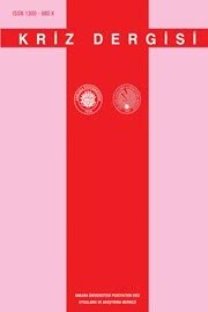Examination of Problem Solving Skills Among University Students with Childhood Trauma Experiences
Objective: Problem solving skills are an important subject to handle with childhood trauma experiences. The aim of this study was to examine problem solving skills with childhood trauma experiences among university students. Methods: Participants consist of 647 students from a Faculty of Education. The Problem Solving Inventory, Childhood Trauma Questionnaire (CTQ) and Sociodemographic Form were administered to the students to collect data. Childhood Trauma Questionnaire scores were calculated as the low and high level of childhood trauma experiences. The independent samples t-test was used to assessment data. Results: There were statistically significant differences between the means of Problem Solving subscale scores (impulsive style, reflective style, avoidant style, monitoring style, confidence style and planfulness style) of the students with the low and high level of childhood trauma (physical, emotional and sexual). Also, the students with both high level of childhood trauma experiences (n=47) and history of suicidal behavior use avoidant style (t=-2.978, p<0.004) and reflective style (t=-2.289, p<0.026) as problem solving skills. Conclusions: The results showed that the students with high childhood trauma experiences are different according to problem solving skills from the students with low childhood trauma experiences. Therefore, improving the problem solving skills in risk groups who are high childhood traumatic experiences is important to well being, to protect from health-damaging and life-threatening behavior.
Anahtar Kelimeler:
Problem solving skills, childhood trauma history, child abuse, university students
___
- Abdulrehman RY, De Luca RV. (2001) The implications of childhood sexual abuse on adult social behavior. Journal of Family Violence, 16: 193–203.
- Aslan, SH. Alparslan ZN. (2000) Initial validity and reliability of the Turkish version of the ChildhoodTrauma Questionnaire. Annals of Medical Sciences, 9: 113-119.
- Bahar G, Savaş AH, Bahar A. (2009) Child abuse and neglect: A review. Journal of Firat Health Services, 4: 51-65.
- Bernstein DP, Fink L, Handelsman L, et al. (1994) Initial reliability and validity of a new retrospective measure of child abuse and neglect. American Journal of Psychiatry, 151: 1132-1136.
- Callahan KL, Price JL, Hilsenroth MJ. (2010) Psychological assessment of adult survivors of childhood sexual abuse within a naturalistic clinical sample. Journal of Personality Assessment, 80(2): 173–184.
- Heppner PP, Petersen CH. (1982) The development and implications of a personal problem solving inventory. Journal of Clinical Psychology, 29: 66–75.
- Johnson DM, Sheahan TC, Chard KM. (2003) Personality disorders, coping strategies, and posttraumatic stress disorder in women with histories of childhood sexual abuse. Journal of Child Sexual Abuse, 12(2): 19-39.
- Leitenberg H, Greenwald E, Cado S. (1992) A retrospective study of long-term methods of coping with having been sexually abused during childhood. Child Abuse and Neglect, 16(3): 399-407.
- Levendosky AA, Okun A, Parker JG. (1995) Depression and maltreatment as predictors of social competence and social problem-solving skills in school-age children. Child Abuse and Neglect, 19(10): 1183-1195:Merrill LL, Thomsen CJ, Sinclair BB, et al. (2001) Predicting the impact of child sexual abuse on women: the role of abuse severity, parental support, and coping strategies. Journal of Consulting and Clinical Psychology, 69(6): 992-1006.O’Leary P. (2009) Men who were sexually abused in childhood: Coping strategies and comparisons in psychological functioning. Child Abuse and Neglect, 33: 471-479.
- Ornduff SR. (2000) Childhood maltreatment and malevolence: Quantitative research findings. Clinical Psychology Review, 20: 997–1018.
- Perrott K, Morris E, Martin J, Romans S. (1998) Cognitive coping styles of women sexually abused in childhood: a qualitative study. Child Abuse and Neglect, 22(11): 1135–1149.
- Roberts R, O’Connor T, Dunn J, Golding J, (2004) The effects of child sexual abuse in later family life; mental health, parenting and adjustment of offspring Child Abuse & Neglec,t 28: 525–545.
- Romans SE, Martin JL, Morris E, Herbison P. (1999) Psychological Defense Styles in Women Who Report Childhood Sexual Abuse: A Controlled Community Study. American Journal of Psychiatry, 156: 1080–1085.
- Rosenthal MZ, Rasmussen-Hall ML, Palm KM, et al. (2005) Chronic avoidance helps explain the relationship between severity of childhood sexual abuse and psychological distress in adulthood. Journal of Child Sexual Abuse, 14: 25–41.
- Roth S, Cohen LJ. (1986) Approach, avoidance, and coping with stress. American Psychologist, 41: 813-819.
- Sachs-Ericsson N, Gayman MD, Kendall-Tackett K, et al. (2010) The long-term impact of childhood abuse on internalizing disorders among older adults:The moderating role of self-esteem. Aging and Mental Health, 14(4): 489–501.
- Sahin N, Sahin NH, Heppner PP. (1993) Psychometric properties of the Problem Solving Inventory in a group of Turkish university students. Cognitive Therapy and Research, 17: 379–396.
- Shapiro DL, Levendosky AA. (1999) Adolescent survivors of childhood sexual abuse: the mediating role of attachment style and coping in psychological and interpersonal functioning. Child Abuse and Neglect, 23(11): 1175–1191.
- Sigmon ST, Greene MP, Rohan KJ, Nichols JE. (1996) Coping and adjustment in male and female survivors of childhood sexual abuse. Journal of Child Sexual Abuse, 5(3): 57–75.
- Simon VA, Feiring C, McElroy SK. (2010) Making meaning of traumatic events: youths' strategies for processing childhood sexual abuse are associated with psychosocial adjustment. Child Maltreatment, 15(3): 229-241.
- Trask EV, Walsh K. DiLillo D. (2011) Treatment effects for common outcomes of child sexual abuse: A current meta-analysis. Aggression and Violent Behavior, 16: 6–19.
- Yang B, Clum GA. (2000) Childhood Stress Leads to Later Suicidality via İts Effect on Cognitive Functioning. Suicide and Life-Threatening Behavior, 30(3): 183-198.
- Wilson DR, Vidal B, Wilson WA, Salyer SL. (2012) Overcoming squeal of childhood sexual abuse with stress management. Journal of Psychiatric and Mental Health Nursing, 219: 587–593.
- ISSN: 1300-980X
- Başlangıç: 1992
- Yayıncı: Ankara Üniversitesi
Sayıdaki Diğer Makaleler
Examination of Problem Solving Skills Among University Students with Childhood Trauma Experiences
Oğuzhan HERDİ, Vesile ŞENTÜRK CANKORUR
Can AYDEMİR, Oğuz Erkan BERKSUN
Alzheimer Hastalarında Uyku Kalitesi ve Uykululuk Halinin Değerlendirilmesi
Bilgen Biçer KANAT, Selma Çilem KIZILPINAR, Burçin ÇOLAK, Okan ER, Ahmet KOKURCAN, Umut ALTUNÖZ, Ayşegül SAKARYA, Sevinç KIRICI BULGUROĞLU, Gülbahar BAŞTUĞ, Erguvan Tuğba ÖZEL KIZIL
Türkiye’de Psikiyatri Yazınının Başlangıcı ve Avni Mahmud Bey’in Eseri: Muhtasar Emrâz-ı Akliye
